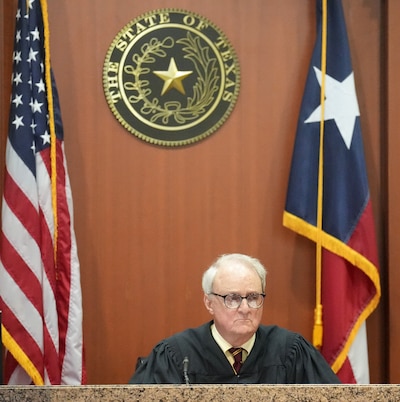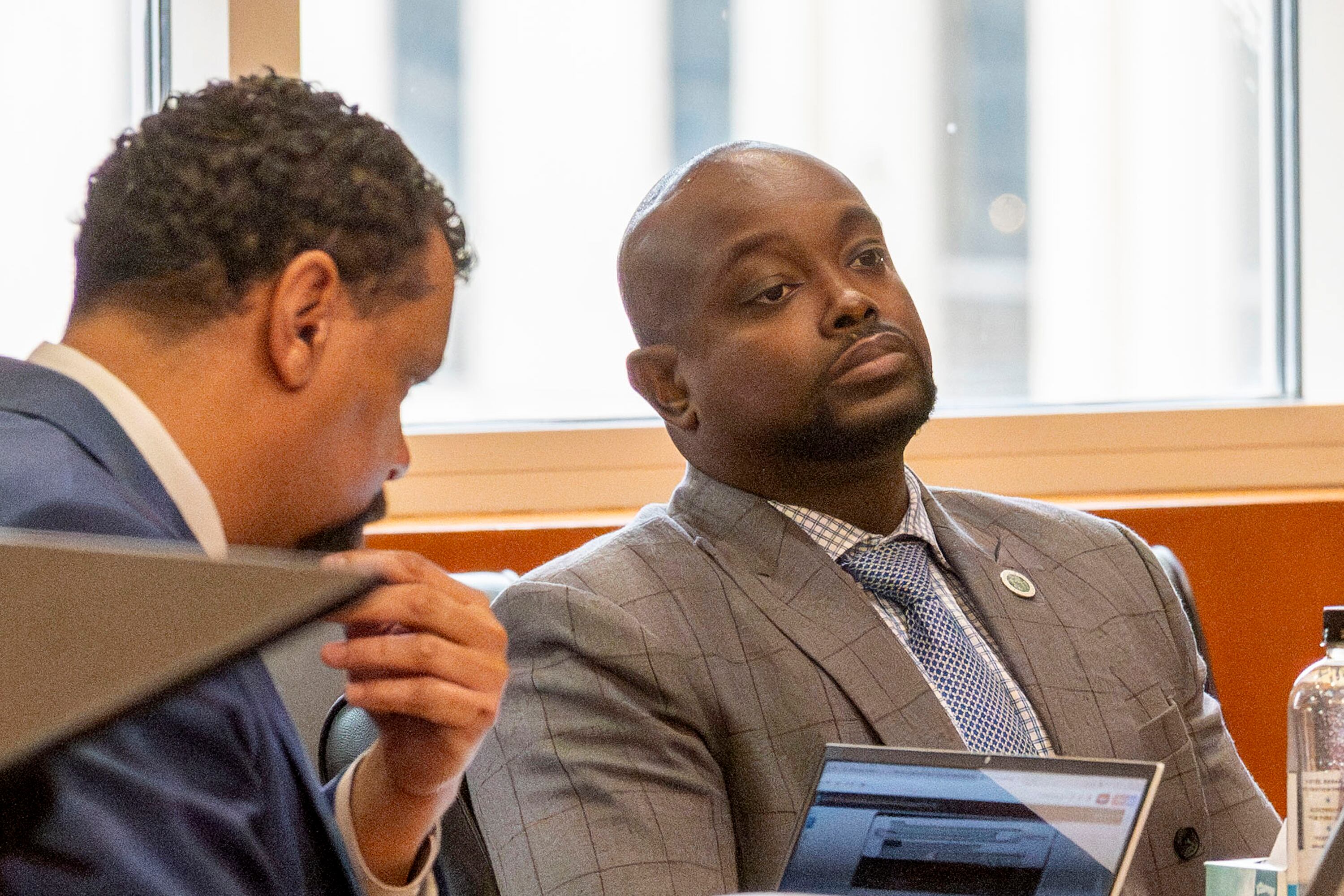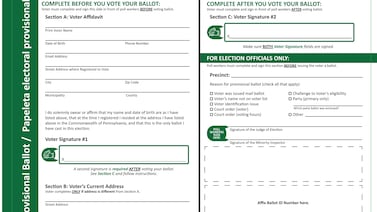Votebeat is a nonprofit news organization reporting on voting access and election administration across the U.S. Sign up for Votebeat Texas’ free newsletter here.
A judge’s decision to order a new election in a close Harris County race from 2022 is putting election officials statewide on notice: Any type of error — large or small — has the potential to trigger a challenge and disqualify votes if the margins are narrow enough.
Some of the problems that prompted the judge’s order occur frequently around the state, especially in high-turnout elections, election officials told Votebeat. With the prospect of election outcomes being negated because of paperwork errors, they said, there’s now added pressure to train election workers and strictly follow procedure.
“We have been stressing the importance of paperwork needing to be filled out properly,” said Trudy Hancock, elections administrator in Brazos County. “We emphasize to our workers how important this is, that we get public records requests, and that we’re already being questioned about why something wasn’t done properly. We’re telling our workers that people are looking at this.”
In the Harris County judicial race in question, the original margin of victory was 449 votes. Judge David Peeples ruled that there were enough questionable votes to put the true outcome in doubt.
Peeples, a visiting judge from Bexar County who had upheld Harris County election results against other challenges, found that more than a thousand votes in Harris should not have been counted because, in most cases, there were deficiencies with two types of forms that some voters have to fill out at the polls.
One is a statement of residence form, filled out by voters who tell election workers at polling places that they have moved. The other is a reasonable-impediment declaration form, filled out by voters who don’t have proper identification and must explain why by listing an allowable reason.
In some cases, the voters filled out the forms with information that the judge found should have rendered them ineligible to vote. For example, the judge found that hundreds of voters wrote on the statement of residence form that they did not actually live in the county. Other forms were technically deficient because they were incomplete — in some cases entirely blank — or missing the signatures of the polling location supervisors, which are required.
Half a dozen election officials counties across the state told Votebeat that the problems with the forms are likely tied to insufficient poll worker training, which would be exacerbated by the loss of experienced poll workers. In almost every county, such problems loom especially large during midterm and presidential elections, when turnout is high.
“We need to make sure those forms are completed, that they’re reviewed before the voter is processed, because that didn’t happen in these cases,” said Bruce Sherbet, the elections administrator in Collin County.
Overturning an election is not unprecedented, but it’s rare. Election law experts say they are aware of no other election outcome that has been overturned based on these types of mistakes. Some worry that if the judge’s order is upheld, it could spur additional challenges to election results based on similar problems, especially in close races.
Joaquin Gonzalez, senior supervising attorney for the Voting Rights Program at the Texas Civil Rights Project, said that if paperwork lapses lead to more election contests and the overturning of results, it could undermine voters’ certainty and confidence in the process.
“And for the voters who turned out to vote in that election once already, it’s erasing their vote,” Gonzalez said.
The Harris County Clerk’s office did not respond to questions about how it plans to prevent similar problems at the polls in the future.
A close race put a spotlight on the problem
The 2022 judicial race in Harris County, for the 180th District Court, pit Republican Tami Pierce against incumbent Democrat DaSean Jones. After her 449-vote loss, Pierce became one of 21 losing Republican candidates in Harris County who challenged the results of the 2022 general election there.
Peeples, who presided over all the cases, found that Harris County made errors, but he upheld the election results in nearly all of them, saying there wasn’t enough evidence to merit a new election. Three of the candidates who challenged their results dropped their lawsuits before his ruling.
Pierce’s case, however, had the narrowest margin. Peeples released his ruling on that case last week, following a two-day trial held in Harris County in April.
Peeples found that the true outcome of the race could not be determined, based on more than 1,000 votes that he said should not have been counted.
Those included 983 voters who were given a statement of residence form, which poll workers give to voters who confirm at check-in at the polls that they’ve moved from the address listed in their voter registration. Some of those voters wrote that they now lived outside of Harris County. Others wrote they lived in a city within the county but failed to write their county of residence, while others left the form blank. Peeples said in his ruling that it was “not lawful to approve” the incomplete forms, or the forms of out-of-county voters.
Peeples also found 445 incomplete reasonable-impediment declaration forms — used by voters to explain why they don’t have an approved form of identification — that he said were not lawful. Peeple said those declarations lacked “a lawful reason for not having a photo ID; a lawful ID substitute and the election judge’s signature.”

The two forms add to tasks for poll workers
The forms exist to deal with issues that come up as poll workers check voters in at the polling place.
During the check-in, election workers are supposed to verify that the voters’ current address matches what’s on file. If the voter says it’s not, then they’re asked if they still live in the county. If they do, they’re asked to fill out the statement of residence form, which helps update their voter registration information later.
Those voters are legally permitted to vote a full ballot based on where they’re registered to vote, which is their old address, Sherbet said.
Voters checking in at polls are also supposed to fill out that form if they are flagged as being on the “suspense” voter registration list. That’s a list of voters whose registration certificates were returned to the voter registrar’s office as undeliverable. The certificates are mailed out every two years.
To avoid being put on that list, voters should update their voter registration information when they move. But many voters cast a ballot only every two years — during midterm and presidential elections — and they don’t always update their voter registration information promptly.
That leaves election judges and clerks at the polling site to deal with address discrepancies and review the forms. If it’s a statement of residence form, poll workers have to be familiar with their county’s geography and boundaries to ensure the addresses entered by the voter qualify them to vote in that polling location; they don’t have access to an automated way to verify that. If the election worker is reviewing a reasonable-impediment form, they also have to be versed on what’s required by law.
Poll workers on Election Day already handle many other prescribed tasks as well as unexpected issues, such as troubleshooting equipment. In Harris County, the third largest county in the nation, election workers are processing thousands of voters at some busy locations.
Harris County’s 2022 election was troubled in several respects. Less than three months before the election, the county hired a new elections director from out of state. Some polling locations had ballot paper shortages, malfunctioning equipment, and late openings that led to long wait times.
In a hectic environment, it is not unusual for things to get overlooked and for some of the issues Peeples pointed out in his ruling to fall through the cracks, Sherbet said.
“There’s no way to avoid this kind of thing,” Sherbet said. “And Harris is such a huge county, and so you’re going to have these kinds of situations occur in every election. Also because you have human beings that are handling this process and they make mistakes, and voters make mistakes.”
Election administrators move to tighten up training and ward off problems
Some election administrators, whose offices have been inundated with election-related litigation and requests for recounts, say they are concerned Peeples’ order could trigger even more litigation in the coming months.
They have worked for years to improve their training materials to ensure poll workers are fully versed in everything the law requires from them.
Days after the order was released, some election officials were thinking about how to prevent similar problems in future elections.
John Oldham, the elections administrator in Fort Bend County, said he plans to keep excerpts of the ruling handy to “give it to our election workers when we do trainings and tell them, ‘Here’s what we shouldn’t see in a statement of residence form,’ and to make sure those forms come back to us completed,” he said.
But problems could persist, no matter how well election workers are trained.
“We’re depending on someone else doing what you’ve trained them to do,” said Jennifer Doinoff, the Hays County elections administrator.
Doinoff and others across the state have struggled to recruit new election workers and to retain the experienced ones. In some instances, less experienced workers are filling in for someone who doesn’t show up to work their shift. And as laws continue to change, some of the election processes could be tough to navigate even for experienced poll workers.
“We’re putting a lot on our poll workers to try to figure out how somebody should be voting. And that, to me, that is the biggest part of this,” she said. “I think we need a definitive law that says, ‘This is how this is going to happen,’ and there’s not going to be any second-guessing from the poll worker or the judges about how somebody should be voting.”
Natalia Contreras covers election administration and voting access for Votebeat in partnership with the Texas Tribune. Natalia is based in Corpus Christi. Contact her at ncontreras@votebeat.org







